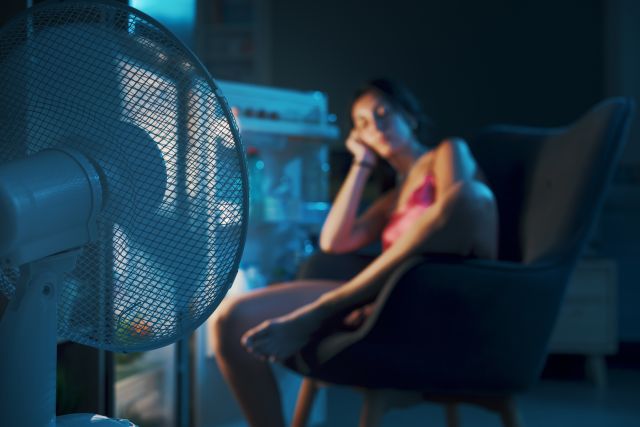Updated on September 26, 2023
If you are experiencing symptoms of perimenopause, the number one thing you should do is talk to a healthcare provider. Though it is a natural part of aging, perimenopause often comes with a number of symptoms that can have a major impact on your quality of life. The most common example is vasomotor symptoms—commonly known as hot flashes and night sweats.
What are vasomotor symptoms?
Hot flashes are sudden episodes of feeling overly hot or uncomfortably warm, often accompanied by sweating, skin flushing, and increased heart rate, and sometimes followed by chills. Night sweats are hot flashes that occur during sleep, which will cause a person to wake up and can also lead to long-term sleep problems.
The symptoms, severity, frequency, and duration of hot flashes and night sweats vary from person to person. Episodes can occur several times a week in some instances, and several times an hour in others.
While episodes can be unpredictable, they can also be caused by certain triggers—like eating a certain food or environments that are too warm or hot.
Lifestyle changes that may help with vasomotor symptoms
There are a number of adjustments to habits and lifestyle that may help a person manage vasomotor symptoms:
- Avoid trigger foods. Some people find that certain foods and beverages can trigger hot flashes. Common culprits include caffeine, alcohol, spicy foods, and hot beverages. Limiting or avoiding these foods and beverages may help reduce symptoms.
- Eat a balanced diet. A balanced diet that includes plenty of fruits, vegetables, whole grains, and lean proteins will support overall health and may help you manage menopausal symptoms. Avoid sugary foods, unhealthy fats, and junk food.
- Maintain a healthy weight. Obesity is associated with more severe vasomotor symptoms. If you are overweight, talk to a healthcare provider about safe, sustainable ways to lose weight.
- Exercise regularly. It is not known if exercise helps reduce vasomotor symptoms (though this is a topic of interest for medical researchers). However, regular physical activity is one of the best things you can do for your health as you age, including your mental health.
- Reduce stress. Stress may make vasomotor symptoms worse. Pay attention to stress levels and consider practicing deep breathing, meditation, or other mindfulness activities.
- Be prepared to cool down. Dress in layers to easily adjust your clothing as needed when you begin to feel warm. Carry a portable fan, and keep a cold pack or a damp washcloth nearby to help cool down quickly during a hot flash.
- Optimize your bedroom for sleep. Cool, dark, peaceful environments promote restful sleep—and may help prevent night sweats. Keep bedroom temperatures cool with fans, air conditioning, or open windows. Choose lightweight, breathable pajamas and bedding to prevent getting too warm during sleep. Limit screen time in the bedroom and close to bedtime.
- If you smoke, quit. Tobacco and nicotine can make vasomotor symptoms worse—and also increase your risk for many other serious health conditions. If you need help quitting, talk to your healthcare provider. There are medications and cessation therapies that can help.
Remember that everyone’s experience with vasomotor symptoms is different. It’s important to explore different strategies to find the ones that work best for you.
Treatment for vasomotor symptoms
There are also therapies that can treat vasomotor symptoms, including hormone replacement therapy and non-hormone medications. This is another topic that you can discuss with a healthcare provider.
A healthcare provider can also help you address the other symptoms that occur during perimenopause, which can include changes in mood, problems with sleep, weight gain, dry skin, changing feelings about sex, depression, difficulty concentrating, and physical discomfort, including discomfort during intimacy. A person’s risk of serious health conditions—including cardiovascular disease and obstructive sleep apnea—also increases as they approach menopause, and are additional reasons to see a healthcare provider.






